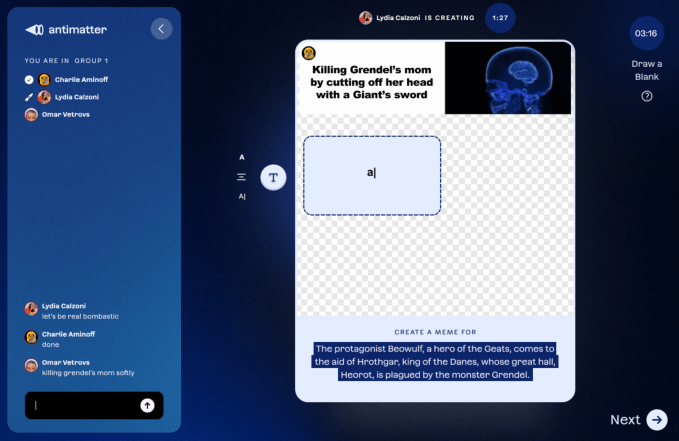Antimatter is an edtech company that operates under a simple, enticing premise: if a student really understands a topic, then they’ll be able to make a meme about it.
“To be able to shitpost, you have to understand the subject matter really well,” Antimatter founder and CEO Jonathan Libov told TechCrunch last year. “In a sense, shitposting is the highest form of consciousness.”
Though it may sound bizarre, Antimatter is proving its hypothesis about the power of shitposting as an educational tool. The company just closed a $2 million seed round, led by Version One.
Tens of thousands of students and teachers are using Antimatter to bring memes into the classroom. Students can make memes with Antimatter’s built-in meme generation tools on the web and iOS, making visual jokes about what they’re learning. Teachers can lead their class through group activities that use memes to help students synthesize information.
In one activity, for example, students get randomly assigned a prompt, and they have to make a meme about the concept. Then, other students guess what the meme is representing. So, if an AP Calculus student gets the prompt of “second derivatives,” they could make a meme that reinforces the concept the concept that d^2y/d^2x, a more complex way of denoting a second derivative, is the same thing as f”(x), a more familiar notation. Other activities encourage students to work together, each filling in the blanks on a meme template to represent a concept related to their studies; another prompts students to write a text conversation between two characters from history.

Image Credits: Calculus memes made by students on Antimatter
“You can’t learn from the meme alone, right? You learn from the discussion of the meme,” Libov told TechCrunch. “It’s the discussion during that review session when all of the learning really happens, when people are looking at each other’s memes and explaining what they created.”
The software behind Antimatter doesn’t just stop at memes. Libov says that the ultimate goal is for Antimatter to be a platform for learning through solving puzzles (and yes, making a meme is a puzzle).
“In the long arc of history, we might be back to cave drawings. It’s visual representations of everything,” Libov said. “Where do kids go when they need to learn something? They don’t go to the blocks of text on Wikipedia and Google, they go to YouTube and TikTok.”
Though Antimatter is designed for students, the company is also working on enterprise tools for large companies (which could also help Antimatter bring in some income). Libov imagines a CEO hosting an all-hands call about quarterly goals, then asking employees to make memes about the company’s strategy for the quarter.
“We spoke to a bunch of [Google employees], and whenever something newsy happens, they turn to memes,” he told TechCrunch. “Every company has this in their Slack.”

Image Credits: Antimatter
With so many powerful tools across the internet, students are inundated with a nearly infinite stream of information. Now, with generative AI tools like ChatGPT, some educators are struggling to make sure students are actually turning in their own work. But with memes and community-centered learning, Antimatter is trying to motivate students to find joy in learning — and if learning is a joy, why ask ChatGPT to write your essay for you?
Libov often jokes that his startup’s ultimate goal is to turn C students into C+ students. Sure, a better pitch would be that he wants to turn C students into A students. But what Libov means is that he’s not trying to put students through an intensive, rigorous tutoring regimen to churn out stellar SAT scores and perfect report cards. Instead, he just wants to make students curious and excited about their education. And if students get better grades along the way, then that’s an added bonus.
Antimatter uses memes to turn C students into C+ students by Amanda Silberling originally published on TechCrunch







